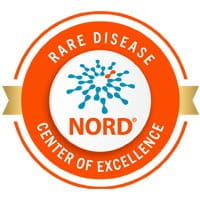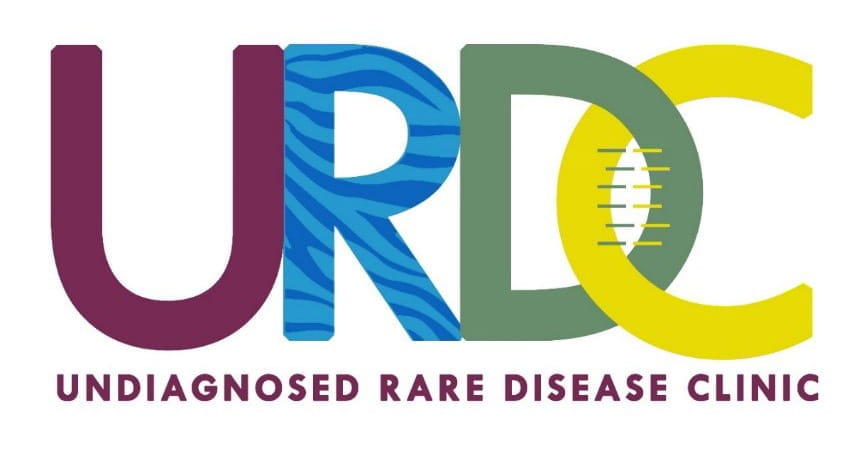The Undiagnosed Rare Disease Clinic, directed by Erin Conboy, MD, was launched in January 2020. Patients include those who likely have a rare undiagnosed disease that has a high likelihood of a genetic cause. This program is focused mainly on pediatrics, but patients may be any age, from newborns to those with adult-onset disorders. Patients have likely been seen by multiple providers and had extensive testing done, but still have not received conclusive results about their condition. Specific expected symptoms include: multiple congenital anomalies, abnormalities (that you can see on physical exam or as internal organ malformations), patients with severe developmental delays, severe autism, severe seizures, or Mendelian disorders (involving one specific gene).
Support our work
Help support our goals to provide leading-edge genetic testing and research, expand program capacity to serve more families awaiting answers, and train the next generation of physician scientists in medical genetics.

Patients meet with the medical geneticist and genetic counselor, who conduct a detailed review the patient’s health history, family history and previous genetic testing. Patient samples are obtained at this visit for genome sequencing, RNA sequencing and metabolic testing. The genome sequencing is processed, analyzed and interpreted with the help of Emedgene, a genomic interpretation platform that incorporates advanced artificial intelligence which combines the use of detailed phenotypic information and genomic annotations present in databases. The genomic variant analysis and interpretation is completed by a multidisciplinary team who discuss the final interpretation before making recommendations in a final report.
The Undiagnosed Rare Disease Clinic is currently funded by an IU Precision Health Initiative grant.
Join the Genome Board
The Genome Board is a forum for a multidisciplinary team of providers, laboratorians, researchers and students to review and discuss patient cases. The team has a detailed discussion of variants, genomic, transcriptomic and metabolic information to help determine if an underlying cause of the patient’s symptoms can be found.
Genome Board is held every other Friday at 12 pm. Please contact Lili Mantcheva to be added to the Genome Board invitation list.
Video
Learn about the Undiagnosed Rare Disease Clinic from director Erin Conboy, MD.

Undiagnosed Rare Disease Clinic uses tech and teamwork to solve medical mysteries
Established in January 2020 through a grant from IU’s Precision Health Initiative, the Undiagnosed Rare Disease Clinic uses team science to sleuth out medical mysteries stemming from genetic code errors.
Undiagnosed Rare Disease Clinic helps family find answers
The Edwards family knew their youngest daughter, Jordan, was struggling with some kind of health issue. Jordan was having trouble with feeding and was barely gaining any weight. After visits to different doctors and testing, their journey led them to the new Undiagnosed and Rare Disease Clinic.
The specialized team at the clinic was able to finally give this family answers. They performed genetic testing on each member of the family and discovered Jordan has a rare genetic disorder that impacts her feeding abilities. Turns out, her mother and older sister have a mild form of the disorder as well.
Undiagnosed Rare Disease Clinic giving families hope
The Undiagnosed Rare Disease Clinic was featured by FOX59.
Undiagnosed Rare Disease Clinic Team

Erin Conboy, MD
Director, Undiagnosed Rare Disease Clinic
Assistant Professor of Clinical Medical and Molecular Genetics
Erin Conboy studied biology at Grinnell College in Iowa, then medical school in Hersey, Pennsylvania and finally finished her training at Mayo Clinic in Rochester, Minnesota. She is a clinical and metabolic genetics physician and pediatrician with a special interest in the diagnosis of rare disease. She is the director of the Undiagnosed Rare Disease Clinic at IU School of Medicine and IU Health. She has two sons and enjoys practicing Brazilian Jiu-jitsu with her family.

Kayla Treat, CGC
Genetic Counselor
Kayla Treat is a pediatric genetic counselor with IU Health and IU School of Medicine. She enjoys seeing a wide variety of clinical indications in the general genetics clinics. She graduated from the IU Genetic Counseling Graduate Program in 2013 and initially accepted a pediatric genetic counseling position at Washington University School of Medicine in St. Louis where she worked in several multidisciplinary clinics at St. Louis Children’s Hospital. She moved back to Indianapolis in October 2014 to accept her current position, and she has loved seeing the growth of the department over the past several years. In 2019 she accepted a new role within the department as the genetic counselor with the Undiagnosed and Rare Disease Clinic. This role felt like a natural fit given her interest in complex genetic syndromes, and she looks forward to seeing the expansion of the clinic over time. She also enjoys working as a clinical supervisor for the IU Genetic Counseling program and recently transitioned to a role as co-course instructor for the medical genetics clinical rotations.

Lili Mantcheva
Program Manager
Lili Mantcheva earned her MPH degree in Social and Behavioral Sciences from the Richard M. Fairbanks School of Public Health Indianapolis and her undergraduate degrees in Chemistry and German from Butler University. Lili has previous experience in various healthcare and public health settings, more specifically as a clinical research coordinator at the Indiana University Neuroscience Center, focused on Alzheimer’s disease research and most recently as a health programs director for a local non-profit organization in Indianapolis. Currently, as the Project Manager for the Undiagnosed Rare Disease Clinic, she is responsible for the day-to-day operational organization, overall framework and protocol development, and patient consenting and coordinating during clinic visits. In her free time, she likes to travel, play tennis, walk/hike outdoors, read, and spend time with her family and friends.

Francesco Vetrini, PhD
Assistant Professor in Medical and Molecular Genetics
Associate Director of the CLIA-NGS laboratory
Co-Director of Clinical Genomic Services, URDC
Co-Director of the MMGE Covid-19 Testing Laboratory
Dr. Francesco Vetrini, PhD, received his doctorate in Medical Genetics from the Second University of Naples in Italy and then went on to complete a postdoctoral fellowship at Baylor College of Medicine in Houston, TX.
Vetrini spent more than four years as the Lead Clinical Genomics Scientist at Baylor Genetics before joining IU School of Medicine in 2018 as an ABMGG fellow in the Department of Medical and Molecular Genetics.
As a genomics scientist with expertise in rare disease and new gene discovery, he was recruited to help Dr. Conboy launch the Undiagnosed Rare Disease Clinic (URDC).
His primary responsibilities as the URDC's co-director include the development of protocols for genomic assessment of patients by integrating genomics, transcriptomics, and proteomics, the formation of collaborations for functional studies of candidate genes and variants and co-leading the medical genetics genome board with Dr. Conboy.
Vetrini leads the genomic variant analysis and interpretation, which is completed by a multidisciplinary team that discusses the final interpretation before making recommendations in a final report.
Vetrini's overarching goal is to end the diagnostic odyssey of patients and families by utilizing an integrated multi-omics approach that will improve our understanding of the molecular basis of genetic disorders, resulting in better patient care and conclusive answers for families.

Marwan K. Tayeh, PhD
Director, Diagnostic Genomics Laboratory
Associate Professor of Medical and Molecular Genetics
Marwan Tayeh, PhD, has recently joined Indiana University to establish a Diagnostic Genomics Laboratory. Dr. Tayeh is currently the Director of the IU Diagnostic Genomics Laboratory, and an Associate Professor in the Department of Medical and Molecular Genetics at IU School of Medicine.
Dr. Tayeh earned his PhD in Genetics in 2007 at the University of Iowa, Iowa City, IA. Dr. Tayeh completed his ABMGG fellowship in Clinical Molecular Genetics and Genomics in 2009 at Emory University, Atlanta, GA. In 2010, Dr. Tayeh joined Prevention Genetics, LLC, as a Clinical Molecular Geneticist and in 2011 joined the University of Michigan as the Director of the Molecular Laboratory of the Michigan Medical Genetics Laboratories.
During his 10 years at the University of Michigan, Dr. Tayeh has developed a wide variety of high-throughput diagnostic assays, such as gene-centric comparative genomic hybridization arrays (aCGH), Methylation assays, and next generation sequencing, to help advancing clinical Molecular Genetics and Genomics testing. Dr. Tayeh has also developed bioinformatics tools to improve Next Generation Sequencing (NGS) data analysis, variant calling, and variant annotation for clinical testing and research purposes.
Dr. Tayeh is involved in national leadership efforts at the American College of Medical Genetics and Genomics (ACMG). His current interests include applying the state-of-the-art technologies to improve diagnostic genetics and genomics testing.

Marcus J. Miller, PhD
Director, Biochemical Genetics Laboratory
Assistant Professor of Medical and Molecular Genetics
Marcus J. Miller, PhD, is an assistant professor in the Department of Medical and Molecular Genetics at Indiana University School of Medicine and serves as the director of the Biochemical Genetics Laboratory within the Indiana University Genetic Testing Laboratories. He earned his PhD in the Department of Genetics at the University of Wisconsin, Madison and completed ABMGG fellowship training and board certification in biochemical genetics and molecular genetics at the Baylor College of Medicine. Dr. Miller’s work focuses on improving methods to diagnosis and manage patients with inborn errors of metabolism with a particular focus on liquid chromatography tandem mass spectrometry applications and the advancement of acylcarnitine analyses.

Tae-Hwi L. Schwantes-An, PhD
Assistant Professor of Medical & Molecular Genetics
Dr. Schwantes-An is a genetic epidemiologist whose work focuses on understanding and identifying genetic underpinnings of complex human diseases. He received his PhD from Washington University in St. Louis and completed his postdoctoral training at the National Human Genome Research Institute at National Institutes of Health. He serves as a co-leader of bioinformatics team for Undiagnosed and Rare Disease Clinic. He is an assistant research professor in the Department of Medical and Molecular Genetics and in the Division of Cardiology in the Department of Medicine.

Amy M. Breman, PhD
Associate Professor of Clinical Medical & Molecular Genetics
Dr. Amy Breman, originally from Fort Wayne, Indiana, is not only a laboratory director in the IU Genetics Testing Laboratories, but also an alumni of the Department of Medical and Molecular Genetics. Dr. Breman graduated with her bachelor’s in biology from Purdue University, and continued her education at IU School of Medicine where she earned her PhD in medical and molecular genetics in 2007.
After graduation, she moved to Houston to join Baylor College of Medicine as a fellow in the Department of Molecular and Human Genetics, where she worked in the research lab of Dr. Arthur Beaudet and later became board certified by the American Board of Medical Genetics and Genomics (ABMG) in the specialty of Clinical Cytogenetics. In 2011, she became an Assistant Professor at Baylor College of Medicine and a laboratory director of cytogenetics at Baylor Genetics labs. During her 10 years with Baylor Genetics, she advanced to Division Director of the Chromosomal Microarray Laboratory and Training Director in Cytogenetics for the ABMGG fellowship program.
Dr. Breman returned to her home state of Indiana in 2018 to join the IU Genetic Testing Laboratories as a co-director of the cytogenetics lab. Since then she has worked to expand prenatal diagnostic testing at our institution and supports the Undiagnosed and Rare Disease Clinic with analysis of genome sequencing data. She has recently completed additional training in the molecular genetics specialty and is currently an active candidate for ABMGG certification in Clinical Molecular Genetics.
When Dr. Breman isn’t in the lab analyzing data or educating trainees about cytogenetics, she enjoys camping, biking, gardening and spending time with her husband, two children, one dog and one cat (all boys!).

Jennelle C. Hodge, PhD
Professor of Clinical Medical & Molecular Genetics
Dr. Jennelle C. Hodge, PhD, is ABMGG certified in both clinical cytogenetics and clinical molecular genetics through the Harvard training program and has practiced these specialties since 2007. She is a director in the Cytogenetics and Molecular Genetics Laboratories at IU School of Medicine and an associate professor in the Department of Medical and Molecular Genetics. Dr. Hodge is involved in national leadership efforts at the American College of Medical Genetics and Genomics (ACMG), the Cancer Genomics Consortium (CGC), and the Association for Molecular Pathology (AMP). She is an author on over 40 research publications in journals such as Cancer Research, Journal of Molecular Diagnostics, Human Molecular Genetics, Modern Pathology, Molecular Psychiatry, Nature Genetics, and the American Journal of Human Genetics. Dr. Hodge also reviews manuscripts for 17 human genetics journals, has developed nine sessions including two short courses for national meetings, and is the editor-in-chief of a genomics-based cancer case interpretation resource called the Compendium of Cancer Genome Aberrations (CCGA.io). Her current interests include applying NGS for rare disease diagnosis as part of the Undiagnosed and Rare Disease Clinic with the goal of constitutional NGS testing validation in the clinical laboratory and engagement in genotype/phenotype research collaborations to benefit current and future patients.

Brett H. Graham, MD, PhD
Associate Professor of Medical & Molecular Genetics
Dr. Graham obtained his MD and PhD from Emory University and then moved to Baylor College of Medicine (BCM) and Texas Children’s Hospital for clinical residency training in pediatrics and clinical fellowship training in medical genetics. After a postdoctoral research fellowship, he joined the faculty of the Department of Molecular and Human Genetics at BCM and rose through the ranks to Associate Professor, where he was an active member of BCM’s NIH Undiagnosed Disease Network (UDN) team. He moved to Indianapolis in 2017 to join the Department of Medical and Molecular Genetics as an associate professor and associate director of clinical genetics. Dr. Graham’s research laboratory is focused on studying mitochondrial biology and disease using models in both mouse and fruit fly. In his clinic, Dr. Graham evaluates and manages patients with medical genetic problems and inborn errors of metabolism.

Marco Abreu
Bioinformatician
Marco Abreu studied biochemistry and chemical biotechnology at East Stroudsburg University in Pennsylvania, then studied bioinformatics at Virginia Commonwealth University in Virginia. He is currently a bioinformatician for the Department Medical and Molecular Genetics Department at IU School of Medicine. He enjoys serving his dog and cat overlords.

Nicole Johnson
Administrative Assistant
Nicole Johnson is an administrative assistant with several years of experience in the university/educational setting. Nicole earned a bachelor’s of science degree in health care administration from the University of Phoenix. In addition to several other programs and responsibilities, Nicole specializes in supporting the day-to-day administrative responsibilities for the director, associate directors and residents for the Medical Genetics Residency program in the Department of Medical and Molecular Genetics.

Whitney Jaunzemis
Clinical Research Coordinator, Indiana Biobank
Whitney Jaunzemis got her degree in recreation sport management with a concentration of youth leadership at Indiana State University. She is the clinical research coordinator for the Indiana Biobank. She supports the sample collections within the Undiagnosed and Rare Disease Clinic. She loves going on walks, exercising and traveling with her husband.

Brooke Patz
Program Manager, Indiana Biobank
Brooke Patz studied biology at Butler University, then obtained her masters in bioethics from Indiana University. She is the program manager for the Indiana Biobank and associated programs. She supports the sample collections within the Undiagnosed and Rare Disease Clinic. She has three children, two daughters and a son, and enjoys taking them on walks to the park.

Benjamin M. Helm, CGC
Assistant Professor of Clinical Medical & Molecular Genetics
Benjamin Helm is a genetic counselor with specific interests in cardiovascular genetics, congenital malformations, rare diseases, and public health genomics. Helm's work is with the cardiovascular genetics program at IU School of Medicine, including the development of cardiovascular genetics services for outpatient and inpatient settings tailored to specific diseases. Based on clinical experiences, Helm's interests are varied: inherited arrhythmias, cardiomyopathies, congenital cardiovascular malformations, and familial hypercholesterolemia. Helm has also developed interests in the genetic architecture of inherited cardiovascular diseases and malformations, specifically in exploring multifactorial etiologies and polygenic risk scores for predicting disease.
Research Interests: polygenic risk stratification/scores for inherited cardiovascular disease, familial hypercholesterolemia (FH), lipoprotein A, congenital cardiovascular malformations, sudden unexplained/cardiac death and post-mortem genetic testing, public health genomics, rare diseases, genomics applications, genetic epidemiology

Dongbing Lai, PhD
Assistant Research Professor of Medical & Molecular Genetics
Dongbing Lai is a statistical geneticist. His research interests are searching for genes related to common and rare diseases, and understanding how these genes cause diseases. These include using genomic data (genome-wide genotype data, whole exome sequencing data, and whole genome sequencing data) to perform genetic studies and identify disease causing genes; then using other omics data (transcriptomics, methylomics, metabolomics, etc.) to investigate the roles of these genes in disease causing.
Collaborators

Stephane Pelletier, PhD
Associate Professor of Clinical Medical & Molecular Genetics
Dr. Pelletier joined Indiana University School of Medicine in the summer of 2020 to establish the Indiana University Genome Editing Center, a core facility whose mission is to provide investigators access to genome editing technologies, and to continue his research program on rare pediatric neurodegenerative conditions, and the development and implementation of new genome engineering approaches. Dr. Pelletier holds a bachelor’s degree in Biochemistry and a master’s degree in Pharmacology from the University of Sherbrooke, and a PhD in Pharmacology from the University of Montreal. He also completed a postdoctoral training in the department of Biochemistry at St. Jude Children’s Research Hospital before joining the Department of Immunology to establish the Embryonic Stem Cell and Genome Editing Facility in 2009. As director of this facility, Dr. Pelletier has pioneered the implementation of CRISPR technology for mouse genome engineering back in 2013 and supervised the generation of hundreds of mouse models and cell lines, establishing himself as a leader in the field.

Kristen R. Suhrie, MD
Associate Professor of Clinical Pediatrics
Dr. Kristen Suhrie obtained her MD from the University of Tennessee and subsequently completed her pediatrics residency and neonatology fellowship at the Children’s Hospital of Pittsburgh of UPMC. In 2021, Dr. Suhrie joined the Departments of Pediatrics and Medical and Molecular Genetics as the director of the perinatal genomics program. She has focused her efforts on diagnosing and caring for newborns with rare genetics disorders. When she isn’t in the hospital, she enjoys gardening, camping, and spending time with family and friends.

Amber L. Mosley, PhD
Professor of Biochemistry & Molecular Biology
Dr. Amber Mosley obtained her PhD from the University of Kentucky and then moved to the Stowers Institute for Medical Research in Kansas City MO. Dr. Mosley joined the faculty in the Department of Biochemistry and Molecular Biology in 2010 and is currently a professor. Dr. Mosley is also the director of the Center for Proteome Analysis, a centralized core at the IU School of Medicine that provides researchers with access to state-of-the-art proteomics including study design, biochemistry support, mass spectrometry, and computational / qualitative analysis. Dr. Mosley’s research laboratory is focused on the application of unique quantitative proteomics approaches to study both basic biological questions and questions related to human disease. The Mosley lab has recently applied the quantitative approach thermal proteome profiling to the analysis of rare disease alleles and is working to develop a toolkit of protein-level analyses to determine how genetic changes in protein sequence can contribute to human disease.